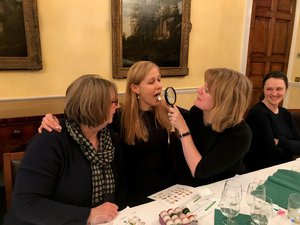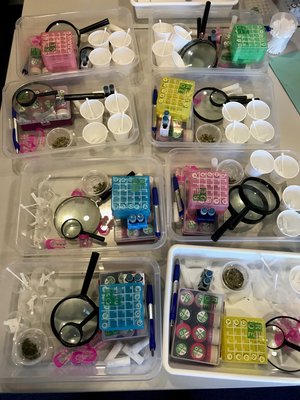The sweet smell of research
The event was proposed and coordinated by St John’s fellow Professor Zoltán Molnár of the Department of Physiology, Anatomy and Genetics.
Professor López-Mascaraque is President of the Spanish
Olfactory Society, at the Department of Molecular, Cellular and Developmental
Neurobiology at the Instituto Cajal-CSIC in Madrid, Spain.
 Our sense of smell is the most sensitive and immediate of our
senses, as the neurons in the brain are directly exposed to the environment. We
can distinguish up to a billion different odours, and at the workshop participants
explored how many they could distinguish, and at what concentrations, in
a series of experiments. Given 12 boxes with different natural aromas, participants
recognised them but found it curiously hard to name them. Once they heard the
names, such as lemon, chocolate, or rose, they could connect them to the correct smell box.
Our sense of smell is the most sensitive and immediate of our
senses, as the neurons in the brain are directly exposed to the environment. We
can distinguish up to a billion different odours, and at the workshop participants
explored how many they could distinguish, and at what concentrations, in
a series of experiments. Given 12 boxes with different natural aromas, participants
recognised them but found it curiously hard to name them. Once they heard the
names, such as lemon, chocolate, or rose, they could connect them to the correct smell box.
 Smell and taste are intricately linked, in fact when we
eat 80% of what we perceive is really smell. Participants explored whether or
not they were ‘super-tasters’. This involved staining the tip of their tongue
with food colouring, and asking a neighbour to count the number of taste buds
in the stained area. Typically, non-tasters have fewer than 8 buds, average
tasters have 8-13 buds, whereas super-tasters have more than 18
buds in a unit area.
Smell and taste are intricately linked, in fact when we
eat 80% of what we perceive is really smell. Participants explored whether or
not they were ‘super-tasters’. This involved staining the tip of their tongue
with food colouring, and asking a neighbour to count the number of taste buds
in the stained area. Typically, non-tasters have fewer than 8 buds, average
tasters have 8-13 buds, whereas super-tasters have more than 18
buds in a unit area.
The participants explored whether they had the special ability to detect bitter flavours such as phenylthiocarbamide (PTC) more intensely than the average person. The ability to taste PTC (or not) is conveyed by a single gene, TAS2R38, that encodes a specific PTC receptor. Two alleles for this gene determine sensitive or non-sensitive receptors. People with two copies of the ‘non-sensitive’ allele are non-tasters, while those with some copy of the ‘sensitive’ allele are either tasters or super-tasters.
Finally, Professor López-Mascaraque explained how smells have some effects that are beyond our conscious control. Intimately linked to our emotions, they can powerfully affect our mood. Each of us has a characteristic smell that is genetically determined; the smell of our peers helps us to feel empathy and regulates our sexual and social behaviour.